Table of Contents
Logistics, the art and science of managing and controlling the flow of goods, information, and other resources from the point of origin to the point of consumption, is a critical backbone of today’s business operations. As the world becomes increasingly interconnected and the pace of commerce accelerates, the significance of efficient logistics in the competitive market cannot be overstated. Logistics software is at the heart of modern logistics management. This technological catalyst drives unprecedented efficiency, accuracy, and reliability in supply chain operation

By harmonizing the intricate dance between transportation, warehousing, inventory tracking, and customer service, logistics software represents more than an optional tool; it is the bedrock upon which agile and responsive logistics networks are built. Seamless integration of software solutions within logistics operations is not just a trend but a transformative movement reshaping how businesses approach their supply chain challenges. Join us as we explore how the best logistics software is crafting the future of goods movement and bringing about a logistics revolution.
Top 09 Logistics Software
Discover the pinnacle of logistics efficiency with Top 09 Logistics Software. From advanced freight management to real-time tracking, our comprehensive solution revolutionizes supply chain management. Stay ahead in the fast-paced world of logistics with Top 09 Logistics Software’s innovative tools and unparalleled support.
NetworkON
NetworkON, a versatile platform, provides robust networking solutions tailored to meet the evolving needs of modern businesses. With a focus on connectivity and collaboration, Networkon.io empowers organizations to optimize their network infrastructure and foster seamless communication.
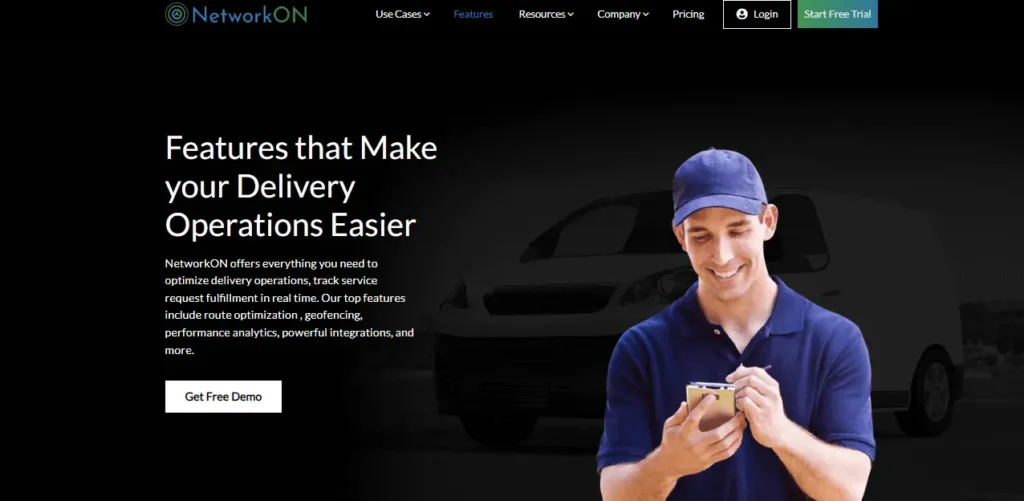
- Best Features: Real-time tracking, Route Optimization, Geofencing , Third-Party Logistics Software, Advanced Analytics, Reverse Logistics
- Limitations: sophisticated interface for new users.
- Pricing: Subscription-based plans starting from $16/month. (additional charges applicable for additional requirements)
- Ideal for: Businesses of all sizes, including logistics operations requiring streamlined task organization.
- Ratings on Capterra: 5.0/5
Magaya
Magaya Corporation offers integrated logistics and supply chain management software, empowering businesses to efficiently manage their operations from end to end. With advanced features for inventory control, freight management, and compliance, Magaya revolutionizes the way companies navigate the complexities of global trade.
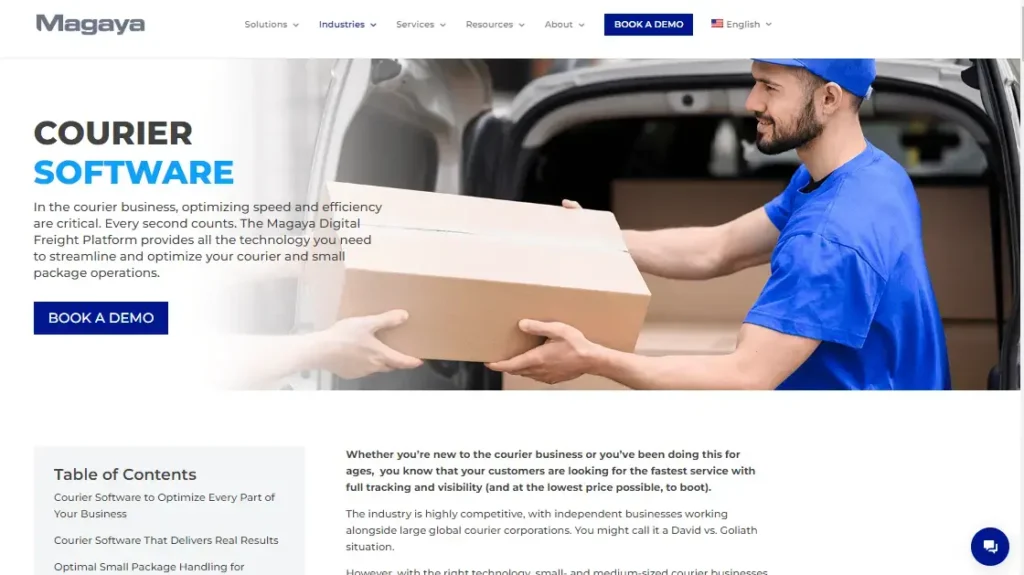
- Best Features: Comprehensive freight forwarding, warehouse management, accounting integration.
- Limitations: Steep learning curve, occasional glitches.
- Pricing: Contact for a quote.
- Ideal for: Freight forwarders and 3PL providers.
- Ratings on Capterra: 4.2/5
Ramco
Ramco logistics Systems is a leading provider of enterprise software solutions, specializing in cloud-based applications for various industries. From ERP to HR and aviation maintenance, Ramco delivers comprehensive solutions designed to drive digital transformation and operational excellence.
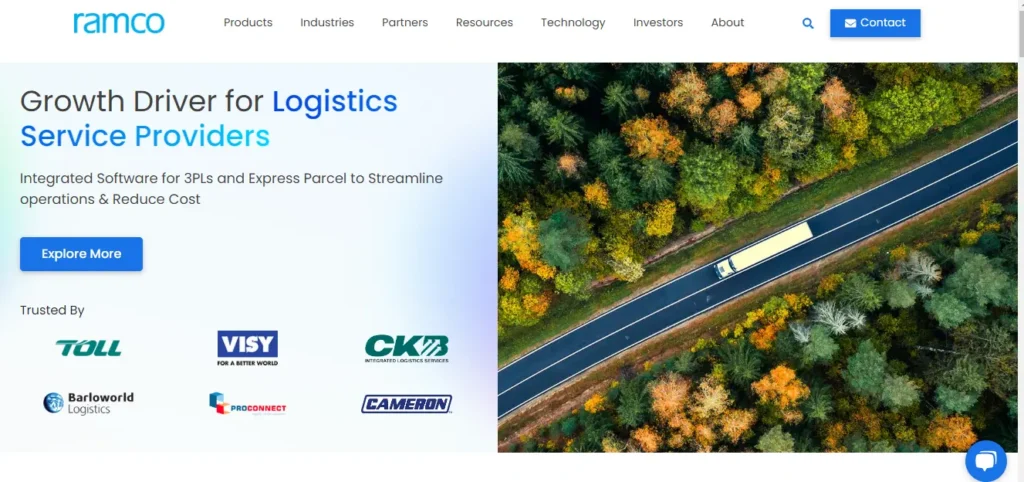
- Best Features: AI-driven optimization, end-to-end supply chain visibility, compliance management.
- Limitations: High initial investment, complex implementation.
- Pricing: Contact for pricing details.
- Ideal for: Large enterprises with complex logistics needs.
- Ratings on Capterra: 4.3/5
ClickUp
ClickUp is a logistics management software platform designed to streamline workflow and increase productivity across teams. With customizable features, intuitive interface, and real-time collaboration tools, ClickUp empowers organizations to manage tasks efficiently and achieve their goals with ease.
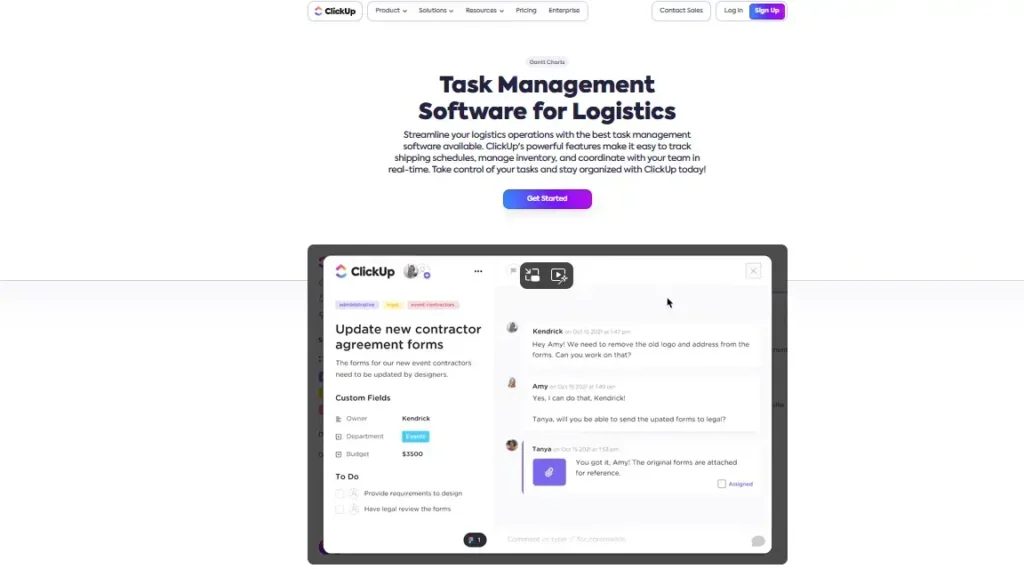
- Best Features: Task management, collaboration tools, customizable workflows.
- Limitations: Limited specific logistics features, may require integration with other software.
- Pricing: Plans starting from $5/month per user.
- Ideal for: Teams seeking a versatile project management solution within logistics.
- Ratings on Capterra: 4.7/5
UpperInc
Upper Inc., a logistics management software offers innovative solutions for human resources and talent management, enabling organizations to attract, retain, and develop top talent. With features for recruitment, performance management, and learning and development, Upper Inc. revolutionizes the way businesses approach HR management.
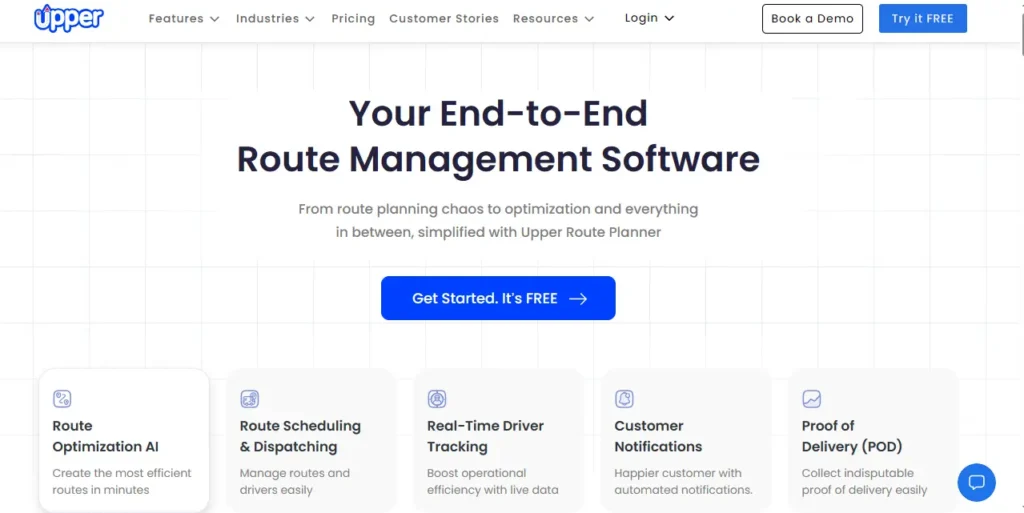
- Best Features: Automated dispatching, driver management, customer portal.
- Limitations: Limited scalability for large enterprises, occasional technical issues.
- Pricing: Starting from $199/month.
- Ideal for: Trucking companies and last-mile delivery services.
- Ratings on Capterra: 4.4/5
Softlink Global
Softlink Global provides end-to-end logistics and freight management solutions, helping businesses optimize their supply chain operations. With advanced features for freight forwarding, customs brokerage, and warehouse management, Softlink Global empowers organizations to achieve greater efficiency and profitability.
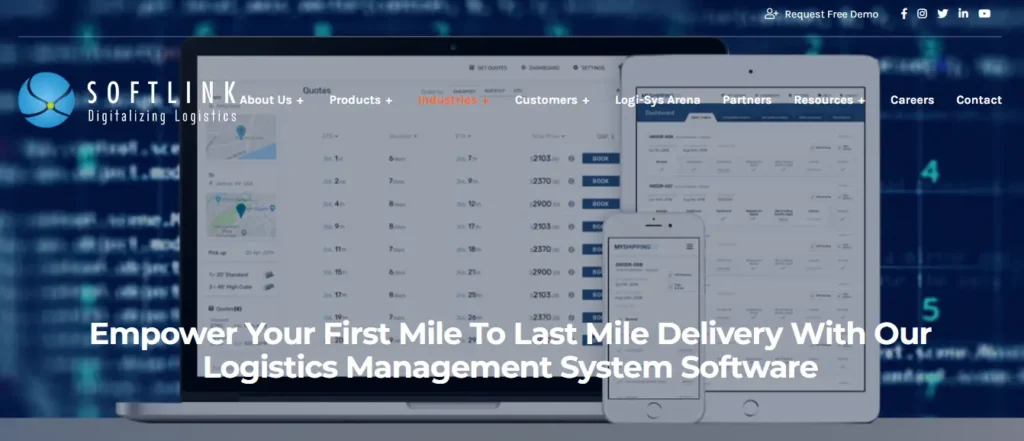
- Best Features: Customs clearance, freight management, EDI integration.
- Limitations: Limited customer support, outdated interface.
- Pricing: Contact for pricing details.
- Ideal for: Freight forwarders and customs brokerage firms.
- Ratings on Capterra: 4.0/5
FarEye
FarEye is a leading provider of delivery management software, offering solutions to optimize last-mile logistics and enhance customer experience. With features for route optimization, real-time tracking, and predictive analytics, FarEye revolutionizes the way businesses manage their delivery operations.
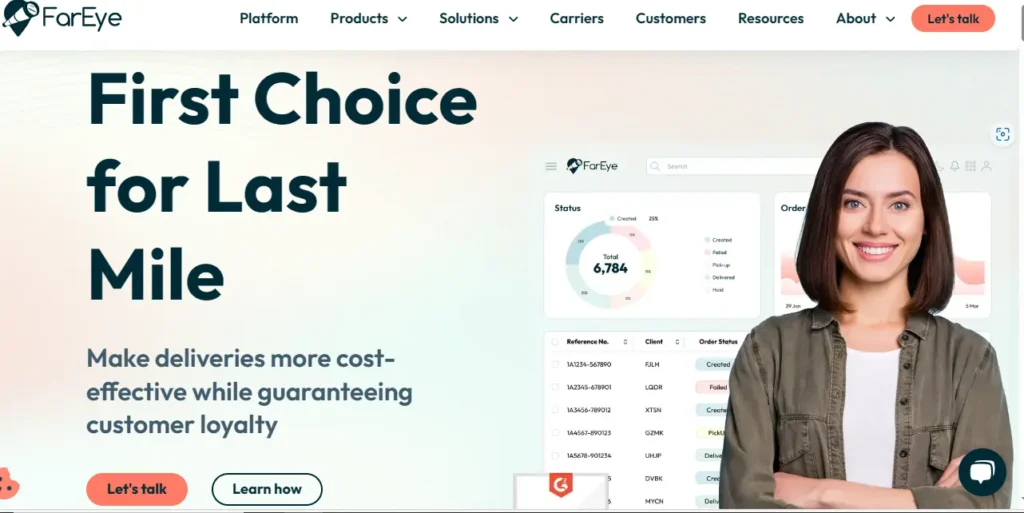
- Best Features: Delivery orchestration, real-time visibility, predictive analytics.
- Limitations: Complex setup process, may require additional customization.
- Pricing: Contact for a quote.
- Ideal for: E-commerce businesses and parcel delivery services.
- Ratings on Capterra: 4.6/5
Zoho
Zoho Corporation a logistics management software, offers a suite of cloud-based business applications, catering to various functions such as CRM, finance, and marketing. With a focus on user-friendly design and seamless integration, Zoho empowers businesses of all sizes to streamline their operations and drive growth.
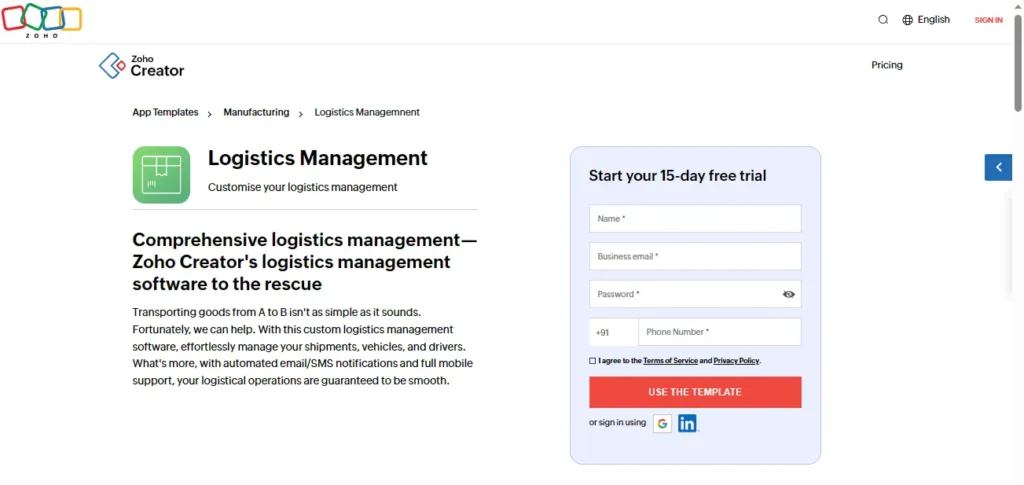
- Best Features: CRM integration, invoicing, document management.
- Limitations: Basic logistics functionalities, may require extensive customization.
- Pricing: Plans starting from $12/month per user.
- Ideal for: Small businesses with basic logistics needs.
- Ratings on Capterra: 4.3/5
SAP
SAP SE is a global leader in enterprise software, offering a wide range of solutions for ERP, CRM, and business analytics. With industry-specific offerings and advanced technologies like AI and machine learning, SAP enables organizations to transform their businesses and stay ahead in a rapidly changing world.

- Best Features: Enterprise-level scalability, end-to-end supply chain management, advanced analytics.
- Limitations: High cost of implementation and maintenance, steep learning curve.
- Pricing: Contact for pricing details.
- Ideal for: Large corporations with complex logistics operations.
- Ratings on Capterra: 4.5/5
The Heart of Logistics Software: Key Features and Functionalities
The software driving its processes is at the core of every effective logistics operation. Logistics software is an advanced tech tool designed to streamline supply chain operations, enhance inventory control, manage warehouses and transportation efficiently, and much more. Understanding logistics software’s key features and how functionalities work is paramount for businesses aiming for operational excellence.
Supply Chain Management
- Real-time data and visibility: With features designed for end-to-end visibility, you can gain unparalleled insight into every segment of your supply chain, empowering proactive decision-making at every turn.
- Collaboration tools: Foster a collaborative ecosystem among supply chain partners with integrated communication tools, streamlining coordination and amplifying synergy across the network.
Inventory Management
- Accurate stock levels: Utilize sophisticated techniques to maintain optimum inventory, reducing overstock and stockouts while ensuring on-time delivery and customer satisfaction.
- Integration with scanning technologies: Seamlessly integrate barcode scanning and RFID technology for real-time inventory tracking, enabling efficient warehouse management and order fulfillment processes.
Warehouse Management Systems (WMS)
- Optimization of storage and retrieval: Elevate the efficiency of storing and retrieving goods with a robust WMS, maximizing warehouse space utilization and minimizing operational costs.
- Role in warehouse operations: Discover how WMS can enhance warehouse performance and facilitate accurate inventory management and seamless order processing.
Transportation Management Systems (TMS)
- Physical movement optimization: Perfect the planning, execution, and optimization of moving goods with a sophisticated TMS, ensuring smooth operations from warehouse to delivery point while minimizing transit times and maximizing resource utilization.
- Route planning and fleet management features: Optimize routes and manage fleets effectively to save time and cost, enhancing delivery efficiency and customer satisfaction through timely and reliable shipments.
Order Fulfillment and Processing
- Streamlining order-to-delivery: Accelerate the journey from order to delivery, ensuring greater efficiency and customer satisfaction while providing real-time tracking updates to keep customers informed at every step.
- Impact on customer satisfaction: A streamlined order fulfillment process directly affects and improves the customer experience, fostering loyalty and positive brand perception, ultimately leading to increased repeat business and referrals.
Predictive Tools: Demand Planning and Forecasting
- Historical data and AI: Leverage past data and artificial intelligence to forecast demand accurately, enabling proactive inventory management decisions and reducing the risk of stock shortages during peak demand periods.
- Accurate forecasting: Employ precise forecasting tools to anticipate market needs, eliminate wasteful oversupply effectively, and optimize production schedules to align with actual demand fluctuations.
Each of these components plays a vital role in the functionality of delivery logistics software, contributing to a more cohesive and efficient logistics management software that drives business success.
Enhancing Transportation Efficiency
Advanced transportation logistics software is pivotal in revolutionizing transportation efficiency within logistics operations. By leveraging sophisticated algorithms and cutting-edge technology, this software allows many tools to optimize every facet of transportation.
Transportation logistics software enhances efficiency through:
Route Optimization: Logistics software analyzes various factors such as distance, traffic patterns, and delivery priorities to make the best of logistics routing software. Minimizing travel time and fuel consumption enhances overall efficiency while reducing operational costs.
Real-Time Tracking: With GPS integration and real-time tracking capabilities, logistics software provides visibility into the location and status of shipments. This enables managers to monitor progress, anticipate delays, and proactively address any issues that may arise, ensuring smooth operations.
Load Consolidation: Through intelligent load consolidation algorithms, the software identifies opportunities to combine multiple shipments into fewer vehicles, optimizing capacity utilization and reducing the number of trips required. This not only lowers transportation costs but also minimizes carbon emissions.
Carrier Management: Advanced logistics software solutions facilitate seamless communication and carrier collaboration. It streamlines selecting the most suitable carriers based on pricing, reliability, and service quality, ultimately improving efficiency and customer satisfaction.
Automated Documentation: The software eliminates manual errors and delays associated with traditional paperwork by automating paperwork and documentation processes. This accelerates the movement of goods through customs and regulatory checkpoints, expediting overall transit times.
Predictive Analytics: Leveraging historical data and predictive analytics, logistics software forecasts demand patterns, market trends, and potential disruptions. With this insight, operators can proactively adjust their strategies, optimize resource allocation, and mitigate risks, enhancing overall efficiency and resilience.
Inventory Management Integration: Integration with inventory management systems enables seamless transportation and coordination of inventory levels. By synchronizing supply chain activities, the software minimizes stockouts, reduces excess inventory holding costs, and ensures timely replenishment, thus optimizing overall efficiency.
Continuous Improvement: Logistics software enables continuous evaluation and improvement of transportation processes through data analytics and performance metrics. Identifying inefficiencies, bottlenecks, and areas for optimization empowers operators to refine their strategies and enhance efficiency over time.
Advanced logistics software serves as the linchpin in the relentless pursuit of transportation efficiency, offering unparalleled tools and capabilities to fine-tune every aspect of transportation operations. By harnessing the power of technology and data-driven insights, logistics operators can drive down costs, improve service levels, and gain a competitive edge in today’s dynamic business landscape.
Pro Tip: Harness advanced logistics software to optimize routing, tracking, and load consolidation while leveraging real-time data for continuous improvement and cost reduction in transportation operations.
Fleet Management
Monitoring and management of transportation assets are critical components of fleet management. Transportation and logistics software provides a centralized system to track a fleet’s vehicles efficiently, ensuring optimal utilization and reducing downtime. Through detailed analytics, companies can predict maintenance needs and manage resources more effectively, bolstering the longevity of their assets.
Ensuring driver safety and regulatory compliance is not just a legal obligation but also a moral one. Logistics software helps uphold these standards by monitoring driver performance, vehicle conditions, and adherence to transport regulations, thus ensuring the safety of drivers and the community at large.
Route Planning and Optimization
A standout feature of modern logistics route planning software is using algorithms to determine the most efficient routes. These algorithms consider many variables, such as traffic patterns, road closures, and delivery windows, to establish optimal paths that save time and fuel and conserve costs.
Furthermore, adjusting for real-time conditions is indispensable in today’s fast-paced logistics environment. Logistics software swiftly responds to unexpected disruptions by recalculating routes on the fly, thereby minimizing delays and increasing service reliability.
Real-time Tracking and Visibility
GPS and IoT technologies for live tracking shipments and assets provide a wealth of data that powers proactive logistics operations management. With real-time logistics tracking software capabilities, logistics managers can gain immediate insight into their goods’ location and status, allowing for swift resolution of any issues that may arise during transit.
The importance of transparency in customer relations cannot be overstated. In an era where information is expected to be at one’s fingertips, providing customers with live tracking information elevates the trust and satisfaction in the services offered, setting the foundation for robust customer relations.
Seamless Connectivity: Integrating Logistics Platforms
3PL (Third-Party Logistics) Software Integration: Integration of 3PL software is crucial for enhancing the flexibility of the supply chain. By streamlining communication between various stages of logistics, businesses can adapt more rapidly to changes in demand, inventory levels, and delivery schedules. Improved data exchange enables all parties to remain well-informed and responsive, reducing the risk of bottlenecks.
- How integration improves supply chain flexibility
- Integrated systems allow for better resource allocation and quicker response times, essential in the dynamic logistics environment.
Many industry leaders have experienced tangible enhancements following integrating third-party logistics (3PL) services. For example, a case study involving a prominent retailer demonstrated a 20% reduction in shipping times and substantial decreases in overhead costs. This highlights the value of incorporating 3PL integrations into retail logistics software to streamline operations and achieve cost efficiencies.
Collaborative Logistics Platforms: The logistics industry is increasingly moving towards collaborative platforms, where shared services and resources help trim inefficiencies. These platforms facilitate better utilization of transportation assets and minimize wastage through enhanced coordination among users.
- The growth of shared logistics services
- As businesses seek to optimize their operations, the trend toward shared logistics services is accelerating.
These collaborative efforts reduce costs and contribute to a more sustainable logistics ecosystem. Platforms like shared warehousing have revolutionized space utilization, turning what was once considered a fixed cost into a variable one. Similarly, joint delivery systems have maximized load efficiency, reducing empty miles traveled and CO2 emissions.
Advanced Technologies Reshaping Logistics
The logistics industry is witnessing a transformation powered by advanced technological solutions. The infusion of new tech boosts efficiency and revolutionizes the core supply chain management processes. Let’s delve into the high-impact technologies that are reshaping logistics.
Barcode Scanning and RFID Technology
Automated data capture has become pivotal in enhancing logistics efficiency. Technologies such as barcode scanning and RFID (Radio-Frequency Identification) offer real-time tracking of goods, reducing manual errors and speeding up processing. These innovations improve cross-docking and distribution strategies, enabling logistics providers to move products swiftly through supply chains with minimal storage time.
Internet of Things (IoT) in Logistics
IoT devices are enabling smarter asset management in the logistics space. With sensors and connective technology, assets can communicate their status, leading to more informed decision-making. From real-time fleet tracking to monitoring the condition of perishable goods, the applications of IoT in logistics software are vast and transformative.
Artificial Intelligence and Machine Learning in Logistics
AI and ML technologies are no longer futuristic concepts; they are actively driving improvements across the logistics sector. Applications range from predictive equipment maintenance to demand forecasting, greatly enhancing operational efficiency. These technologies also play a significant role in customer service, providing intelligent support and personalized experiences. Numerous studies underscore the value of AI and ML in optimizing various facets of logistics operations.
Data-Driven Decision-Making in Logistics Software
The logistics software industry thrives on precision and the ability to make informed decisions swiftly. Herein lies the indispensable role of data-driven decision-making. By harnessing the analytical power of logistics software, businesses can transform vast amounts of logistics data into actionable insights, shifting from reactive to proactive operations.
Analytics and Reporting
Modern logistics software is equipped with robust analytics and reporting capabilities. This feature is critical for transforming logistics data into a format decision-makers can use to draw insightful conclusions. With the ability to create customizable reports, logistics managers can track performance metrics in real time, enabling swift adjustments to enhance efficiency and reduce costs.
- Transforming logistics data into actionable insights to improve supply chain visibility and decision-making.
- Customizable reports that allow for performance tracking and trend identification, contributing to strategic planning.
Cloud-Based Logistics Solutions
As logistics technology evolves, cloud-based logistics solutions are becoming increasingly prevalent. These platforms offer extensive benefits, including but not limited to their scalability and accessibility attributes. With these solutions, businesses can scale their logistics operations up or down without significant upfront investments.
- The advantages of scalability and accessibility allow for efficient management of resources and adapt instantly to changing market demands.
- Data integration and security features ensure that even the most sensitive logistics information is kept secure and seamlessly integrated across various facets of the supply chain.
Fostering Customer and Partner Relations
Effective logistics is not merely about transporting items from point A to point B; it’s equally about nurturing and maintaining robust relationships with customers and partners. Logistics software stands at the forefront of this endeavor, equipping businesses with the tools to ensure satisfaction and loyalty among those who matter most.
Customer Relationship Management (CRM) for Logistics
CRM functionalities integrated into logistics software are pivotal in adapting logistics operations to customers’ requirements. These powerful tools:
- Tailoring logistics experiences to customer needs: The software facilitates personalized service delivery by tracking customer preferences and anticipating their demands, ensuring logistics operations align closely with customers’ expectations.
- Strengthening partnerships through CRM analytics: Advanced analytics provide insights into partner and customer behaviors, enabling logistics companies to build stronger, more informed relationships and, therefore, foster deeper loyalty and trust.
Return Management (Reverse Logistics)
In the cyclical world of logistics, reverse logistics is an area where businesses can truly differentiate themselves. A trustworthy logistics software streamlines managing returns to bolster customer trust. This encompasses:
- Managing returns efficiently to enhance customer trust: Prompt and hassle-free return processes directly contribute to a positive customer experience, encouraging repeat business and positive word-of-mouth.
- Software tools for a smoother reverse logistics process: Logistics software automates returns management, reducing errors, saving time, and improving efficiency, resulting in a win-win situation for clients and businesses.
Logistics software is essential for managing tangible goods and fostering intangible bonds with those in your supply chain. A strong emphasis on CRM and efficient reverse logistics within these platforms can significantly contribute to lasting business success.
Ensuring Compliance and Security in Logistics Software
Within the complex logistics landscape, compliance and security are non-negotiable pillars ensuring the integrity and reliability of any logistics software. As these systems become increasingly interconnected and essential to supply chain operations, adhering to strict industry standards and regulations is paramount to maintaining trust and operational excellence.
Compliance and Security in Logistics Software
Logistics software is entrusted with many sensitive data streams that orchestrate the flow of goods across borders and through various regulatory environments. These systems must be built to comply with legal frameworks, protecting both the logistics providers and their clients from potential legal repercussions and financial losses associated with non-compliance.
Adhering to Industry Standards and Regulations
Adherence to industry-specific regulations, such as the International Air Transport Association (IATA) guidelines for air freight or the International Maritime Organization (IMO) standards for shipping, is a fundamental requirement for shipping logistics software. This compliance is dynamic; it demands continuous monitoring and updating systems in line with evolving laws and standards to ensure seamless and legal transportation of goods.
Protecting Sensitive Data within the Logistics Network
With the constant exchange of information, logistics software has become a prime target for cyber threats. Protecting sensitive data, including personal information, trade secrets, and transaction details, is critical. Implementing robust security measures such as encryption, access controls, and regular security audits is essential to defend against data breaches and cyberattacks. The goal is to create an impregnable digital fortress that always safeguards the logistic network’s integrity.
- Encryption: Encrypting data to ensure that the information remains inaccessible and unintelligible to unauthorized parties even if intercepted.
- Access Controls: Establishing strict user permissions so that only authorized personnel can access sensitive data, minimizing the risk of internal threats.
- Security Audits: Performing regular security assessments and penetration testing to identify and rectify potential vulnerabilities within the system.
Logistics software must embody a fortress of security and compliance to protect assets, data, and reputations. In an industry where trust is a currency, only those who invest diligently in these areas will sustain the confidence of their customers and the market.
Pro Tip: Safeguard your logistics software by continuously updating for compliance with industry regulations, implementing robust encryption, access controls, and regular security audits to protect sensitive data and ensure operational integrity.
The Future of Logistics Software
As we look to the horizon, the logistics software landscape is poised for transformative change, especially for logistics software for small businesses. With rapid technological advancements and industry shifts, it becomes imperative for businesses, regardless of size, to adapt and stay ahead of the curve. The future of logistics software is not just an extension of current capabilities but a leap into a world of greater efficiency, agility, and intelligence, particularly crucial for small businesses aiming to compete effectively in a dynamic market environment.
The Ongoing Evolution of Logistics Technology
The logistical arena is no stranger to innovation. The ongoing evolution of logistics technology has continuously offered new tools and systems that enhance the performance and productivity of supply chains. With the integration of artificial intelligence, machine learning, and the Internet of Things (IoT), logistics software is becoming more predictive and adaptive. These advancements promise to provide unprecedented insight and control over the logistics process.
Preparing for Emerging Trends and Innovations
Adapting to the shifting landscape requires an anticipatory approach. Logistics professionals must be vigilant and ready to embrace the latest trends and harness innovations to maintain a competitive edge. Influential trends such as autonomous vehicles, drone delivery, and blockchain for enhanced transparency and security are on the brink of becoming mainstream within logistics operations.
- Autonomous Vehicles: The development of self-driving trucks and automated guided vehicles (AGVs) will significantly affect transportation networks, reducing operational costs and increasing safety. This evolution underscores the importance of incorporating advanced technologies into truck logistics software to optimize operations and leverage the benefits of automation.
- Drone Delivery: Drones offer a glimpse into the future of last-mile delivery with their ability to quickly and efficiently transport goods, mitigating traffic congestion and accessibility issues.
- Blockchain Technology: As a secure and transparent way to document transactions, blockchain technology can revolutionize supply chain logistics software management by enhancing traceability and reducing instances of fraud.
The emerging trends and innovations present a thrilling preview of what’s to come. The continued progress in logistics software will fuel a new age of logistical operations where the power of data, automation, and seamless integration paves the way for remarkable efficiency and strategic foresight.
Key Takeaways:
- Modern logistics software is indispensable for efficient supply chain management. It offers real-time data visibility, collaboration tools, and predictive analytics to optimize processes.
- Advanced transportation logistics software utilizes algorithms, real-time tracking, load consolidation, and carrier management to optimize routes, enhance tracking, reduce costs, and improve overall efficiency.
- Integration of logistics platforms, including 3PL services and collaborative logistics platforms, fosters flexibility, reduces inefficiencies and promotes sustainability through shared resources and services.
- Technologies like barcode scanning, IoT, AI, and cloud-based solutions are reshaping logistics by enhancing tracking, asset management, decision-making, and scalability, setting the stage for predictive and adaptive logistics operations.
- The strategic value of logistics software lies in its ability to streamline operations, improve decision-making, strengthen customer relationships, ensure compliance, and position businesses for growth and competitiveness in a dynamic market environment. The future is bright for businesses ready to invest in the next generation of logistics software.
Conclusion: The Strategic Role of Logistics Software
As we’ve explored throughout this discussion, logistics software has become the cornerstone of modern business efficiency and agility. These innovative solutions have transformed the landscape of logistics delivery management software by streamlining operations, enhancing data-driven decision-making, and improving customer relationships.
Companies considering implementing or upgrading their transport logistics software must weigh their options carefully. They must select a solution that meets their business’s immediate needs and aligns with long-term growth and scalability. The right software should incorporate key features such as transportation efficiency, integration capabilities, advanced technological support, and robust security measures.
The strategic value of embracing digital transformation within the logistics industry cannot be overstated. Those who leverage logistics software effectively will find themselves at a significant advantage in an increasingly competitive market. It enables businesses to adapt swiftly to changing market dynamics, meet evolving customer expectations, and manage complex compliance requirements more easily.
Keep outdated processes from holding your business back and leveraging modern logistics software in today’s fast-paced market. It is not just an option; it’s necessary to ensure peak operational efficiency and customer satisfaction.
Secure a brighter future for your logistics operations with NetworkON. By evaluating and investing in the latest logistics solutions, you’ll set your enterprise up for success and stay ahead of the competition.
Contact us today, & take the first step towards optimizing your supply chain and enhancing your bottom line.
Frequently Asked Questions
What are the benefits of implementing logistics software in my business?
Logistics software offers numerous benefits, including enhanced visibility into supply chain operations, streamlined inventory management, optimized transportation routes, improved customer satisfaction, and better decision-making through data analytics. By automating processes and integrating various functionalities, logistics software can drive efficiency, reduce costs, and ultimately boost competitiveness in the market.
How does logistics software ensure compliance and security in supply chain operations?
Logistics software prioritizes compliance and security through various measures. It adheres to industry-specific regulations such as those set by the International Air Transport Association (IATA) or the International Maritime Organization (IMO). Additionally, logistics software implements encryption, access controls, and regular security audits to protect sensitive data and mitigate cyber threats. By continuously updating systems and monitoring legal frameworks, logistics software ensures the integrity and reliability of supply chain operations.
What role does logistics software play in fostering customer and partner relations?
Logistics software is crucial in nurturing relationships with customers and partners by providing personalized services, tracking customer preferences, and anticipating demands. Through features like Customer Relationship Management (CRM) functionalities, logistics software strengthens partnerships by offering insights into partner behaviors and fostering loyalty and trust. Additionally, efficient returns management through reverse logistics processes enhances customer trust and satisfaction, contributing to lasting business success.
What makes NetworkON stand out among other logistics software providers?
NetworkON distinguishes itself through its commitment to cutting-edge technology and comprehensive solutions. Our platform offers advanced features such as real-time data visibility, predictive analytics, and seamless integration capabilities, empowering businesses to optimize their supply chain operations easily.




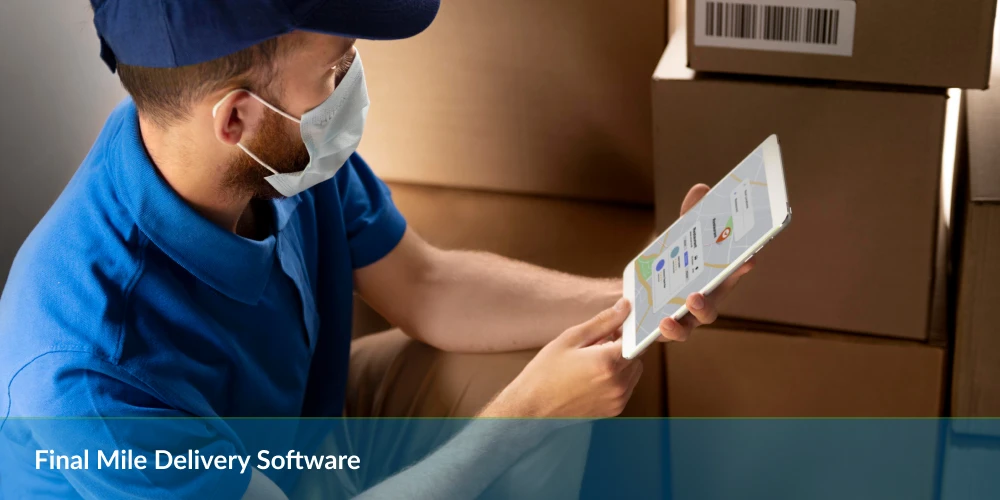
Flooring
Wow amazing blog layout How long have you been blogging for you made blogging look easy The overall look of your web site is magnificent as well as the content